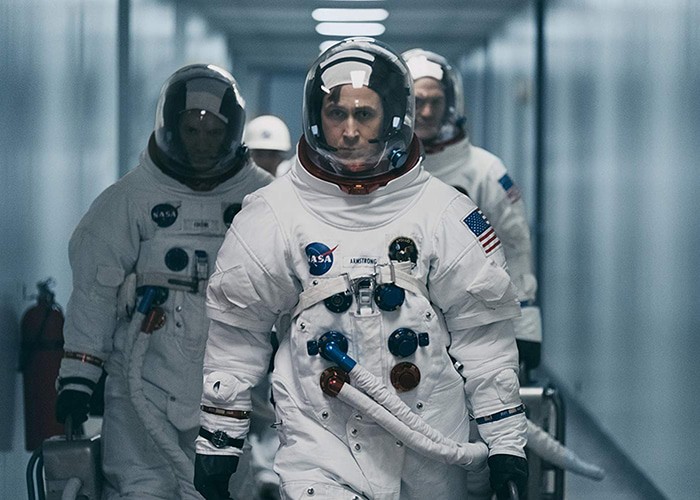
Sound does not travel in the void of space, and yet something about going out of this world just seems to inspire film composers to bring their A-game. From John Williams’ Star Wars themes to Hans Zimmer dialing up his dramatic tendencies to 11 for Interstellar, the final frontier has inspired some of the greatest and grandest film scores of all time. After taking home the Oscars for Best Original Score and Best Song with La La Land, film composer Justin Hurwitz reteamed with frequent collaborator Damien Chazelle last year for First Man, an understated biopic recounting the life of Neil Armstrong (Ryan Gosling) up to and including the Apollo 11 mission. Oscar nomination snub aside, the score of First Man was one of the most notable of 2018, full of elegant melodies and making fantastic use of the theremin, an electronic instrument that largely fell out of film score fashion around the time man stepped on the moon. A few weeks ago, I had the opportunity to speak over the phone with Justin Hurwitz about his experience on the film, including what it was like working with the theremin and his thoughts on why he and Damien Chazelle make such a good team.
Here is our conversation in full:
From other coverage I’ve read online, you learned the theremin for this film. Is that correct?
Yes.
What was that experience like?
It was fun. Damien mentioned the theremin, so I got one and then started messing around with it. I think what we were so taken with was how expressive it can be and how emotional it could sound and how, when we put our melody on it, the melody became very emotional.
I learned with a very improper technique. I think if a real theremin player saw me play they would be pretty appalled by my technique. I just kept waving my hands at it until I could sort of play our stuff on it. It was fun to learn. I really enjoyed learning a bunch of new things for this score, and the Theremin was one of those things.
Looking at the history of film and the theremin, it was used quite frequently in science fiction films, often as a sort of extraterrestrial voice… did that history factor at all into the use of the Theremin for First Man?
Yeah. We liked the idea that it is so associated with ’50s and ’60s sci-fi because Damien would always describe it as these astronauts [being] on a “science fiction” mission of their own—they were going off into the unknown without any idea of what they were going to find—so we liked the idea of infusing the score with a certain science fiction quality. But at the end of the day, the most important thing is the emotion and the score contributing to the mood and the feeling that it needs to, the emotional beats it needs to. So like I said, when we discovered how expressive and emotional the theremin could be, that’s when we really figured it could work.
And what I really love about the theremin is that, yes it does have that sort of electronic, other-worldly sci-fi quality, but it also feels very human. It can take on qualities of a human voice if you play it a certain way. It can feel almost like singing or crying. There are a lot of points where it felt like the theremin could almost be an outpouring of the emotion that Neil was keeping so contained. He’s such a restrained and contained character, but there were certain moments in the end, in the last half an hour of the movie, where he is kind of cracking open, and it could feel almost like the theremin was pouring out, almost like an expression of his innermost pain.
“What I really love about the theremin is that, yes it does have that sort of electronic, other-worldly sci-fi quality, but it also feels very human.”
Especially when the theremin takes on those really human, voice-like qualities, it just felt like it could work very well in that way, and it felt like the theremin was almost this intersection between technology and humanity because it is so electronic and so futuristic in some ways, but it also feels… it responds to your body. It responds to every little movement you make and therefore it can feel like such an outgrowth of your body, and because of that, that’s why it takes on some of those very human qualities.
Is it a very different experience than playing another instrument, in that way?
I mean, I don’t play a lot of instruments. I really only play the piano. And theremin is very different than the piano in the sense that it’s all about intonations with the theremin. With the piano, the notes are the notes. So as long as the piano is in tune, every note is a real note, at least. But [with] the theremin, finding the notes is half the challenge, and I’ve never played an instrument where intonation really matters. I never played a string instrument where you can’t be sharp and you can’t be flat, you have to be just right. My ear didn’t develop for intonation, to consider intonation, because I grew up playing the piano. So that was really challenging, to make sure that I was playing in tune. Basically, I would play every cue where I needed to track the theremin on it—I would just play the melody over and over and over and over again until I had it right, or until I could piece it together. I almost treated it like recording a vocal, where I would do a million takes and then cut together the best pieces of it to try to create a performance out of it.
Was there any scene—or theme—from the film that proved to be especially difficult in that regard, or were they all similarly challenging?
I mean, I would say there were two very different kinds of music in this movie. We wanted it to all feel like the same score, but the movie goes back and forth between these very grand and majestic scenes, and then these very intimate, quiet scenes, and they both posed different challenges. You know the big, sort of heavy music was… it’s always just a challenge to sort of build and orchestrate that kind of music. It’s very time-consuming. But in some ways, the biggest challenges of the movie were scoring the really quiet moments because the movie was so intimate, so documentary-style in some places. Damien felt like he needed music in certain scenes, but to be able to create music and have music play a role without getting in the way of the very intimate, nuanced performances and scenes… it was very challenging to figure out how to sort of introduce music in certain scenes.
“In some ways, the biggest challenges of the movie were scoring the really quiet moments”
I think, when I watched the film, that was one of the things that really impressed me about the score. When talking about great film scores, there are film scores that are great to just listen to, but then in the context of the film sometimes they can be a little too overwhelming—or the reverse, where, in the context of the film they do what they need to do, but you wouldn’t necessarily listen to them just to listen to them. Are there any tricks, in your experience, to finding a balance?
First of all, I rely so much on Damien. He really knows what he wants and he’s very specific with what he wants and if something is too much or too little. He will keep pushing me to revise and revise and revise until it’s what he wants. And also, I just really trust his instincts. I think he has a really great sense of all elements of his movies, and I just really trust what he wants me to be doing.
That being said, we both rely so much on screenings, and a big part of our process is we screen the movie over and over again and so, for First Man, we were screening it at least once a week for months. For most of the post-production, we were screening the movie every week for friends and family and the studio and preview audiences and anybody we could. Every time you screen your movie you get a sense of what’s working and what’s not working, and how people are feeling and how people are responding to it. And if you watch it with them, if you sit in the room with them, you can really feel the audience’s energy, and then if you talk to them afterward you get a sense of how they feel about certain characters and how they feel about certain scenes, and that’s so helpful.
It was really an iterative process of every single week screening the movie, trying to feel how the score was working and how the score was affecting people, and then continuing to refine and shape it. Every single week, just continuing to shape it based on how it felt in the context of the whole movie and how it felt in the screening to these people, to these audiences, and that’s how we refined it over time.
How much would you say the score evolved over the course of these screenings? Was it a matter of, like, timing and volume, or were you really going back and changing things?
All of it. I mean, constantly changing, going back and changing every single week, changing the cues. A lot of it had to do with small changes in spotting exactly where the cues enter, where the cues exit. A lot of it had to do with instrumentation. Changing whether something is on harp or whether it’s on theremin or whether it’s on strings. Just continuing to refine all of it until it was, sort of, fitting in the right way and until it felt good in the context of the movie. And then we need to experience the movie all the way through to get a sense of how the score strings together and how the score feels in one long run.
You and Damien Chazelle have had quite a successful creative partnership. Why do you think you work so well together? What makes for a successful creative partnership?
I think trust is maybe the biggest thing. We both put so much faith in the other person and I put a lot of faith in his movies and his instincts and his choices, and he puts a lot of faith in me in terms of believing that I’m going to pull off what I need to, and I think that’s such a crucial part of any collaboration, and it helps that we have so much history together. We’ve known each other since we were eighteen and we’ve been making movies together since we were about 20 and I think all that history adds up to quite a bit of trust in each other.
First Man is now available on digital platforms and 4K, Blu-ray, and DVD.
This interview has been edited for clarity.
Related Topics: First Man, Justin Hurwitz, Music

